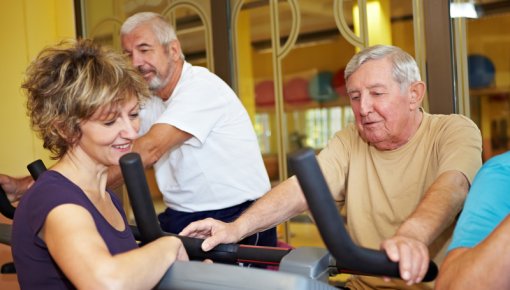Allen NE, Canning CG, Almeida LR et al. Interventions for preventing falls in Parkinson's disease. Cochrane Database Syst Rev 2022; (6): CD011574.
De Dreu MJ, van der Wilk AS, Poppe E et al. Rehabilitation, exercise therapy and music in patients with Parkinson's disease: a meta-analysis of the effects of music-based movement therapy on walking ability, balance and quality of life. Parkinsonism Relat Disord 2012; 18 Suppl 1: S114-119.
Dos Santos Delabary M, Komeroski IG, Monteiro EP et al. Effects of dance practice on functional mobility, motor symptoms and quality of life in people with Parkinson's disease: a systematic review with meta-analysis. Aging Clin Exp Res 2018; 30(7): 727-735.
Gollan R, Ernst M, Lieker E et al. Effects of Resistance Training on Motor- and Non-Motor Symptoms in Patients with Parkinson's Disease: A Systematic Review and Meta-Analysis. J Parkinsons Dis 2022; 12(6): 1783-1806.
Klamroth S, Steib S, Devan S et al. Effects of Exercise Therapy on Postural Instability in Parkinson Disease: A Meta-analysis. J Neurol Phys Ther 2016; 40(1): 3-14.
Okada Y, Ohtsuka H, Kamata N et al. Effectiveness of Long-Term Physiotherapy in Parkinson's Disease: A Systematic Review and Meta-Analysis. J Parkinsons Dis 2021; 11(4): 1619-1630.
Seid AA, Demirdel E, Aychiluhm SB et al. Multidisciplinary Rehabilitation for People with Parkinson's Disease: A Systematic Review and Meta-Analysis. Parkinsons Dis 2022; 2022: 2355781.
Shen X, Wong-Yu IS, Mak MK. Effects of Exercise on Falls, Balance, and Gait Ability in Parkinson's Disease: A Meta-analysis. Neurorehabil Neural Repair 2016; 30(6): 512-527.
Suárez-Iglesias D, Santos L, Sanchez-Lastra MA et al. Systematic review and meta-analysis of randomised controlled trials on the effects of yoga in people with Parkinson's disease. Disabil Rehabil 2022; 44(21): 6210-6229.
Tomlinson CL, Patel S, Meek C et al. Physiotherapy versus placebo or no intervention in Parkinson's disease. Cochrane Database Syst Rev 2013; (9): CD002817.
IQWiG health information is written with the aim of helping people understand the advantages and disadvantages of the main treatment options and health care services.
Because IQWiG is a German institute, some of the information provided here is specific to the German health care system. The suitability of any of the described options in an individual case can be determined by talking to a doctor. informedhealth.org can provide support for talks with doctors and other medical professionals, but cannot replace them. We do not offer individual consultations.
Our information is based on the results of good-quality studies. It is written by a team of health care professionals, scientists and editors, and reviewed by external experts. You can find a detailed description of how our health information is produced and updated in our methods.

